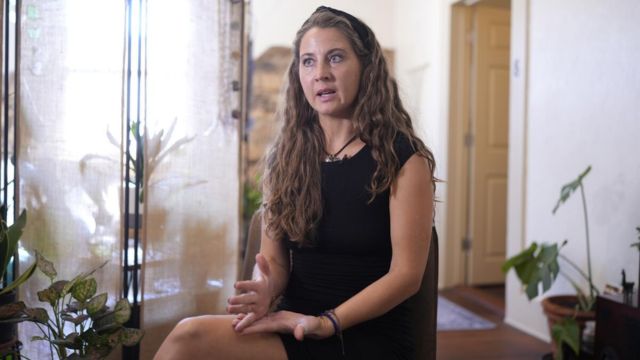WASHINGTON — It hurt and bled a lot, and Kyleigh Thurman didn’t know that her unplanned pregnancy could kill her.
She was given a pamphlet about miscarriages and told to “let nature take its course” by doctors at Ascension Seton Williamson in Texas before being sent home without care for her ectopic pregnancy.
When the 25-year-old woman came back three days later still bleeding, the doctors finally agreed to end the pregnancy by giving her a shot. It was too late. Thurman’s fallopian tube was damaged when a fertilized egg grew on it. This ended her reproductive system.
Thurman and the Center for Reproductive Rights asked the government to look into whether the hospital broke federal law when staff didn’t treat her at first in February 2023 in a complaint they made last week.
Thurman said, “I was left to flail.” “It was nothing but being lied to.”
Even though some states have banned abortions since the Supreme Court overturned the constitutional right to one more than two years ago, the Biden administration says doctors must perform abortions when they are necessary to save a woman’s life. Texas is challenging that advice, and the Supreme Court did not decide the case earlier this summer.
An Associated Press review of federal hospital investigations found that since 2022, more than 100 pregnant women in medical trouble who went to emergency rooms for help were turned away or given bad care.
Two women, one in Florida and one in Texas were left in public bathrooms to lose their babies. After being sent home from the emergency room in Arkansas, a woman went into septic shock and her unborn child died. At least four other women with ectopic pregnancies had trouble getting help. One woman in California needed a blood transfusion after sitting in an emergency room for nine hours.
Abortion bans make it harder to get safe prenatal care.
Doctors in Texas could spend up to 99 years in jail if they are found guilty of performing an illegal abortion. Legal and medical experts say this makes it harder to make decisions about emergency pregnancy care.
The Center for Reproductive Rights says that even though the state law says that ending an ectopic pregnancy is not abortion, the harsh punishments make Texas doctors afraid to treat those patients.
A lawyer for the center, Marc Hearron, said, “Hospitals and doctors should be just as afraid of breaking federal law as they are of breaking these state abortion bans.” If hospitals break federal law, they could be investigated by the government, given heavy fines, or even lose their Medicare funds.
The group called the Centers for Medicare and Medicaid Service last week and said that two patients in Texas emergency rooms, including Thurman, who had ectopic pregnancies were not treated.
An Arlington, Texas, hospital sent Kelsie Norris-De La Cruz home without treating her ectopic pregnancy, even though a doctor said that doing so was “not in her best interest,” according to a lawsuit. She lost a fallopian tube and most of an ovary.
In a statement, she said, “The doctors knew I needed an abortion, but these bans make it almost impossible to get basic emergency medical care.” “This is my complaint because women like me deserve justice and for those who hurt us to be held responsible.”
It can be hard to make a clear diagnosis of an ectopic pregnancy. Three doctors who were consulted for this story said that doctors can’t always tell where the pregnancy is on an ultrasound. An ectopic pregnancy is shown by high hormone levels, bleeding, a positive pregnancy test, and a scan that shows the uterus is empty.
Kate Arnold, an OB-GYN in Washington, said, “You can’t be 100%. That’s the tricky part.” “Those things are time bombs.” That which can only grow so much is becoming pregnant.
John Seago, director of Texas Right to Life, said that doctors who end ectopic pregnancies are not punished by state law, even if they “make a mistake” in identifying them.
“Sending a woman back home is not only not necessary but also very dangerous,” Seago said.
But Hannah Gordon, an emergency medicine doctor who worked in a Dallas hospital until last year, said that the state law has “absolutely” made doctors afraid to treat pregnant patients.
She remembered a woman who came to her Dallas emergency room with signs of an ectopic pregnancy. OB-GYNs said they couldn’t say for sure what was wrong, so they didn’t end the pregnancy until she came back the next day.
Gordon said, “It left a bad taste in my mouth.” She left Texas trying to get pregnant and was worried about the care she’d get there.
“Oh my God, I’m going to die”
She went back to Ascension Seton Williamson a third time, and her OB-GYN told her she would need surgery to remove the damaged fallopian tube. Thurman refused because he was still bleeding a lot. She would not be able to have children if she lost the tube.
When she didn’t get help right away, her doctor told her she could die.
Thurman said through tears, “She came in and told me I needed to have surgery or a blood transfusion or I was going to bleed out.” “That’s when I thought, ‘Oh my God, I’m going to die.'”
The hospital wouldn’t say anything about Thurman’s case, but in a statement, it said it “is committed to providing high-quality care to all who seek our services.”
Federal records show that a 15-week pregnant woman in Florida leaked amniotic fluid in the emergency room at Broward Health Coral Springs for an hour. An ultrasound showed that the woman did not have any amniotic fluid around the baby, which is very dangerous because it can lead to a major infection.
The woman had an abortion in a public bathroom that same day, after being sent home from the emergency room by the doctor who said her situation had “improved.”
She was rushed to another hospital and put on a respirator. After six days, she was then sent home.
At that time, Florida law said that abortions after 15 weeks were illegal. A reporter talked to the obstetrics medical director at Broward Health Coral Springs. He said that starting labor for anyone with premature rupture of membranes before they are born has been “the standard of care for a while, regardless of heartbeat, due to the risk to the mother.”
The hospital wouldn’t say anything.
In a different case in Florida, a doctor said that state law made it harder to provide emergency pregnancy care.
A doctor at Memorial Regional Hospital in Hollywood, Florida, told an investigator that staff cannot step in unless there is a danger to the patient’s health. The investigator was looking into why the hospital did not offer an abortion to a woman whose water broke at 15 weeks, long before the fetus could live.
Problems go beyond states that ban abortion
The AP’s review found that serious violations that put the health of a mother or her unborn child at risk happened in states with and without abortion bans.
Two hospitals in Idaho and Washington, which were short-staffed, told detectives that they often sent pregnant patients to other hospitals.
A pregnant woman who went to the emergency room in Bakersfield, California, was quickly triaged, but the staff didn’t notice how serious her condition was—her uterus had ruptured—until it was too late. An expert concluded that the delay may have played a part in the baby’s death.
The papers say that doctors in emergency rooms in California, Nebraska, Arkansas, and South Carolina either didn’t check for baby heartbeats or sent patients home while they were in active labor, leaving them to give birth at home or in ambulances.
Many women are afraid to go to the emergency room because there aren’t enough nurses and doctors, it’s hard to staff ultrasounds around the clock, and there are new rules against abortion. This is according to Dara Kass, an emergency medicine doctor and former U.S. Health and Human Services official.
She said, “It is getting less and less safe to be pregnant and go to the emergency room for care.”


























+ There are no comments
Add yours